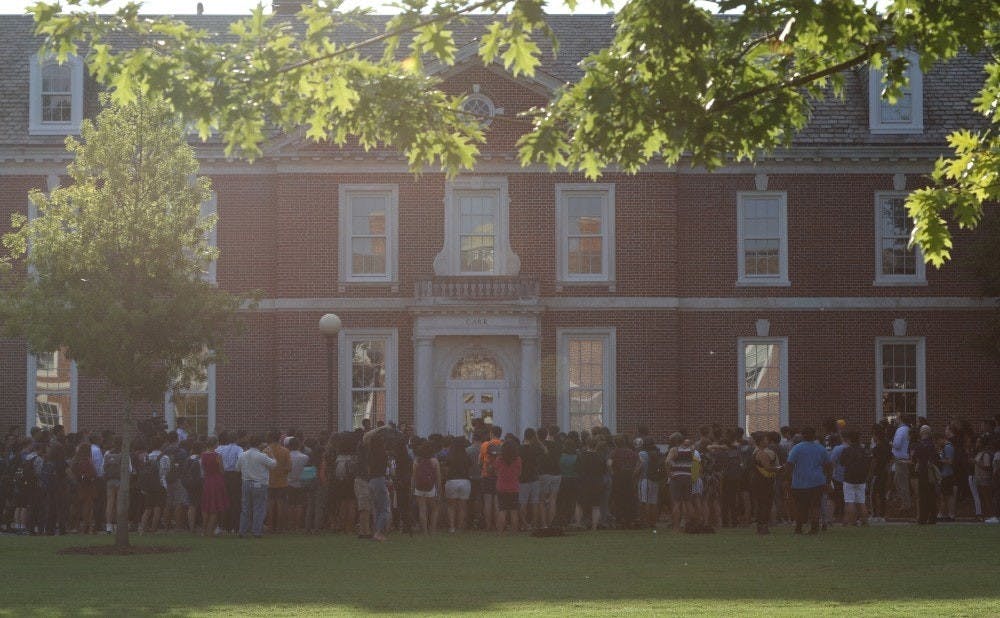Answer: Just like healthcare.
We like to think that being in an impressive place destines us to do impressive things. This hope is nothing new. The Romans had their cursus honorum—literally, the “course of honors.” Fortunate sons would move up a chain of offices increasingly less provincial and more powerful, setting their sights on high office. The Chinese for centuries regulated entry into the imperial civil service through a grueling examination in Confucian texts and theory. And do we not hope that an internship yields a full-time offer, or that a single test score will open every door?
We embrace the same hope: enter elite pipeline, make big difference. In any given week, we’re invited to hear a plethora of speakers, whose collected resumes would yield a small book. Inside our majors, our courses are neatly lined up in a safe and sure progression. But this hope leaves us wanting: how do we fix those ills staring us in the face now, when we order our lives in pursuit of “then?” Talk to anyone you please. Ask them why they’ve chosen the path they have. Their reply will likely be, “I’m so frustrated because of ‘x,’ and I think ‘y’ will be the perfect way to fix it. ‘Y’ is The Thing that will make a difference.”
We’re left with a question: what are we going to do to make the world a better place in the years it will take us to get to The Thing?
Life gave us an answer: exactly what we did to partially reverse the University’s decision to cut healthcare from certain financial aid packages.
I write this before, and because of, the midterm elections. My last edits were submitted Tuesday. I have no idea what we woke up to today. But we would be remiss if we failed to realize that whatever we must do now, whatever the political way forward is, we have a playbook for activism and engagement written by our collective actions during these last two weeks.
Fear: Engaging with the problems of the here-and-now will keep me from getting to The Thing where I can make my difference. Fact: Engagement is not an either/or choice. I can both do my work and give help where help is needed. No one for a moment stopped being a student when they started caring. No dedicated student group was formed. We talked about this online and in person, as we were able. We put pressure on those accountable, as we were able. We demonstrated our ability to be full-time students, fully involved in our own governance. Why should our approach to civic engagement be any different?
Fear: There is no way I can remain engaged—impactfully engaged—until change occurs. Fact: You can. You just did. We did not let this go. There was not a day discussion about health insurance wasn’t heard of over coffee or on the C1. We named names and we focused on the issue. Will political problems have timelines longer than two weeks? Absolutely. Consider this conditioning: you are increasing your fitness as someone civically engaged.
Fear: Once I’m in this fight, I’m in it for the long haul. Fact: That’s the only way to win. As President Price’s letter makes clear, this partial walk-back guarantees healthcare for current undergraduates on aid only. For as long as we have left, whether a few months or three years, securing more and better for our peers will remain our concern. The work is never finished. All we can do is leave less to those who come after us.
Fear: As if the powers-that-be would ever listen. Fact: They did. We start to lose—to lose our fight, to lose fitness as citizens of anything—when we think of “the powers-that-be” as anything other than people. We learned that people listen to good arguments made in good faith. We made no ultimatums. We forced no action. We postured ourselves as partners in progress and in dialogue, as full members of this community to be respected as such. We let the might of right speak for us. We let truth and not thunder make our case. We took the moral high ground and held it. We gave no one the least reason to dismiss us.
And it is a fact that many of us fear, and have cause to fear, what the months ahead will hold. Whatever happened at the ballot box, hold on to this moment. Know that you have the drive to make the change you can and the ability to make that change reality. Take a moment to appreciate what so many students did. Students. We are not yet doing The Thing that will leave our mark on the world. The Thing is a hope. What we achieved for our peers is reality. What we did by engaging in the moment, by caring and mobilizing and committing to something, is real.
So, in these coming months, keep your convictions and keep your playbook to hand. Do not fear that doing what you can is not enough. It was enough for your peers, and it can be enough for your neighbors if you choose to make it so.
I close with the words of the Welsh poet Dylan Thomas. “Good men, the last wave by, crying how bright/ Their frail deeds might have danced in a green bay,/ Rage, rage against the dying of the light.” However bleak the situation seems, press on. You made your stand in whatever way you could, and the powers-that-be relented. Do that again, politically.
Tim Kowalczyk is a Trinity senior. His column runs on alternate Wednesdays.
Get The Chronicle straight to your inbox
Signup for our weekly newsletter. Cancel at any time.
Tim Kowalczyk is a Trinity sophomore. His column, "the academy matters," runs on alternate Thursdays.

